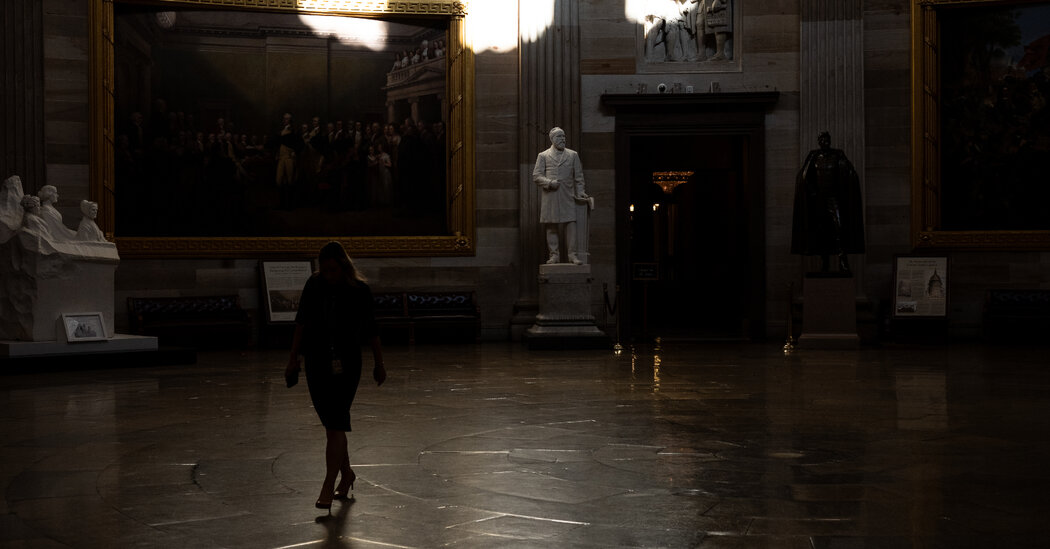Copyright The New York Times

President Trump and congressional Republicans calculated at the start of the government shutdown that they would avoid negotiations with Democrats, let the public pressure build and then watch them fold. More than a month in, that strategy appears to have been a miscalculation. The shutdown has stretched on for 37 days — the longest in history — and there is considerable disagreement in both parties over how to get out of it. One thing is clear: As Republicans and Democrats continue to dig in, polling shows that public opinion has shifted against Republicans, a fact Mr. Trump acknowledged this week. But instead of calling for a meeting with congressional Democrats, Mr. Trump has turned his attention to his own party, repeatedly pushing Senate Republicans to end the filibuster, something for which there is little appetite. Republicans fear such a move would come back to haunt them when Democrats are in the majority. “I think it’s time for them to end the filibuster and just put everybody back to work,” Mr. Trump said on Thursday. He added that doing so would allow Republicans to jam through more of his agenda while they were in control of Congress, including sweeping changes to how elections are carried out. “Vote in voter ID,” he said. “Vote in no mail-in voting, except for military, far away military, and people that are very sick.” He added: “There’s so many things we could put in, including tax cuts that we could get, and we could do it all ourselves, but to do that, you have to end the filibuster.” The president said he was also looking at changes to health care policy, but insisted it was not his fault if costs of health care under the Affordable Care Act skyrocketed. “Obamacare is a disaster. The Obamacare premium is going to go up 17 or 18 percent and that’s not my fault,” Mr. Trump said. “I didn’t want Obamacare. That’s the fault of the people that put it in, the Democrats, and now they want to subsidize further.” It was the second day in a row Mr. Trump had attempted to persuade Senate Republicans to kill the filibuster, which requires 60 votes to advance most legislation. A senior White House official said the administration’s strategy was still to try to convince Democrats to reopen the government by voting for a short-term funding bill. But if they show no signs of doing so, Mr. Trump will continue to ramp up pressure on Senate Republicans to get rid of the filibuster, the official said. The previous longest shutdown in government history ended in 2019 after Mr. Trump, who had insisted on funding for a border wall, entered into negotiations with Democrats and backed off his demand. But apart from a single meeting just before the shutdown began, Mr. Trump this time has declined to engage in negotiations with Senator Chuck Schumer of New York, the minority leader, and Representative Hakeem Jeffries of New York, the top Democrat in the House, who forced the shutdown to try to extend expiring health care benefits. Not only has Mr. Trump declined to meet, House Republicans have refused to return to Washington until the shutdown is over, saying that they will not enter into negotiations until Democrats reopen the government. But electoral victories this week have only hardened Democrats’ position. While there have been some informal talks between rank-and-file senators about a way out of the shutdown, Democrats see Tuesday’s election results as affirming their choice to fight over health care costs. Voters roundly rejected G.O.P. hopes for victory in the races for New Jersey governor and Virginia attorney general. Democrats seem to believe voters, frustrated with the direction in which Mr. Trump is taking the country, will reward them the longer they stand up to the president’s agenda. Speaking to reporters in the Capitol on Thursday, Mr. Jeffries criticized Senator John Thune of South Dakota, the majority leader, for his strategy of scheduling more votes on a short-term spending bill, even though a majority of Senate Democrats have repeatedly blocked it. “It’s a clown show over there in the Senate,” Mr. Jeffries said. He called Mr. Thune “divorced from reality.” “What about what happened on Tuesday, do Republicans not understand?” Mr. Jeffries said. “They got wiped out all across America.” Donald Moynihan, a public policy professor at the University of Michigan, said that weeks ago, Republicans may have believed they would be in a stronger position with the public, given that they had put forward a short-term funding bill to keep the government open. “But the reality is, for the public, Trump is the dominant political figure of our time. He is also the person who’s presented himself as the master deal maker,” he said. “It’s just natural that most people who are not paying close attention to the ins and outs of negotiations will say, ‘Well, Trump’s the guy in charge. So if the government isn’t open, it’s his fault.’”



